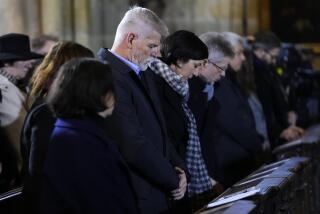Prague Basks in the Quiet Afterglow of Successful Revolution
- Share via
PRAGUE, Czechoslovakia — After nearly two weeks of raw emotion, a quiet afterglow fell over Prague on Wednesday--the afterglow of success.
It came amid signs that the city was returning to normal. In Old Town Square, municipal workers trimmed a large Christmas tree, and nearby, a cluster of students drank and listened as a friend strummed a guitar.
Gone was the electric sense of anticipation that had characterized the past couple of weeks, starting in the mornings and building up to huge demonstrations.
Now, the few hundred young people in Wenceslas Square had not come to make a revolution but to see where one had been made.
The largest crowd in Prague was not demonstrating for freedom. It consisted of tourists outside the 14th-Century Town Hall, waiting for the chimes of one of Europe’s oldest clocks to sound.
People were looking for bargains, not justice.
Wall posters started coming down as teams of students moved through the city center wielding solvent and razor blades. They had promised the shopkeepers they would clean up, and they were keeping their promise.
The only new posters were in the subway station near the Parliament building, where the legislators were meeting in emergency session to consider a draft amendment that would end the Communist Party’s dominant role.
“Deputies, Vote for the Voters, Not Yourselves,” a poster urged. Another read, “Communist Party Under the Parliament, Not Parliament Under the Communist Party.”
The liberty bell put up by the students last weekend was still on a hillock overlooking the city, where a 40-foot-tall statue of Josef Stalin once stood.
On a window ledge just off Wenceslas Square, the thousands of candles lighted in the days of protest had melted into a great slab of wax. Only one small flame flickered.
In a small plaza not far from the opposition Civic Forum’s headquarters at the Magic Lantern Theater, Jiracek Zdenek was back in business, after a hiatus of 10 days, doing a brisk trade in lottery tickets.
In this afterglow of success, there was a new sense of self-confidence, of genuine happiness. The people of Prague seemed to walk with a bounce in their step. Heads were held high, and there were smiles on faces that for 20 years had seemed uniformly glum and downcast. Strangers greeted one another with laughter.
A student who accidentally jolted a briefcase from the hand of a passer-by was told, with a smile, “That’s all right.”
The longest line in the city center was not for some sought-after consumer item. It was outside Civic Forum headquarters, and it was made up of people waiting to enlist in the movement for democracy.
Old-timers recalled that a similar mood accompanied the brief, heady days of the 1968 reform effort, the so-called Prague Spring.
“When people are happy, they are nice to each other,” a woman commented. “When they are frustrated, they are nasty and glum. We’ve turned human again.”
More to Read
Sign up for Essential California
The most important California stories and recommendations in your inbox every morning.
You may occasionally receive promotional content from the Los Angeles Times.













